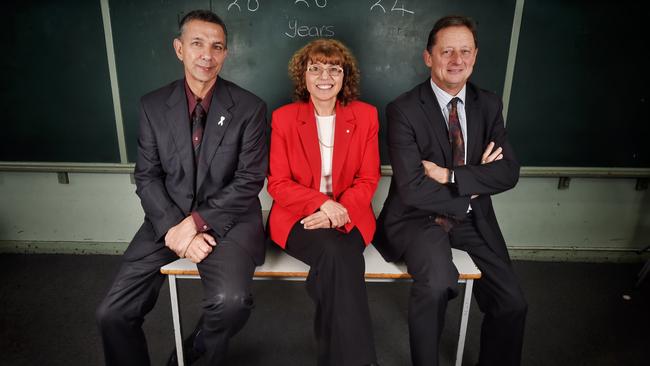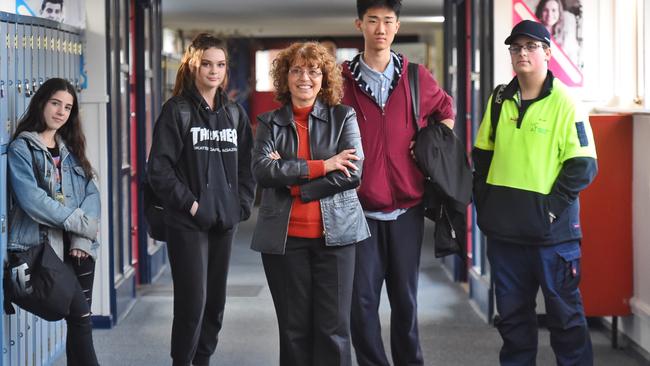Top principals say home pressure can damage results
TOP school principals say home pressure can damage students’ results, warning overbearing parents may be “infecting” kids with their worry over exam results.
VIC News
Don't miss out on the headlines from VIC News. Followed categories will be added to My News.
STRESSED parents are putting so much pressure on children they risk damaging their performance at school.
Three leading educators have warned that overbearing parents may be infecting kids with worry over exam results and homework.
The trend is one of many identified by three long-serving secondary school principals.
Melbourne High School’s Jeremy Ludowyke, Raffaella Galati-Brown OAM, of the Northern College of the Arts and Technology, and Essendon Keilor College’s David Adamson have a collective 131 years of experience in teaching — including 78 years in the top job.
The trio was unanimous about the need for parents to put the brakes on worrying.
MORE: AUSTRALIAN SCHOOLKIDS TOP WORLD’S STRESS LIST
STUDENTS MAY LEARN STRESS FROM PARENTS, STUDY FINDS
STUDY STRATEGIES TO HELP ACE YOUR EXAMS

“When kids are stressed the last thing they need is to go home to a stressed parent,” Mr Adamson said.
“Talk to your children in the car, but don’t nag them, be honest and open, have discussions, try and have a relationship.”
Ms Galati-Brown, who received an Order of Australia medal for service to education in 2008, said ATAR was “not the be all and end all”.
“Anyone who finishes Year 12 has a lot of options: they can do VCE, VCAL, Cert IV, then diploma or into a degree,” she said.
She has seen the damaging effects of stress on her students first hand.
“We have all noticed the number of students suffering from severe anxiety and depression and the number of them that are on medication,” she said.

Mr Ludowyke, who heads the select-entry Melbourne High School, highlighted uncertainty over the future as a cause of stress.
“You might have selected a professional pathway for yourself at age 15 in the old days, and that’s not the reality anymore,” he said.
“So that’s been a huge shift in one generation and I don’t think we should underestimate how much it changes their thinking about their own future.”
Mr Ludowyke said parents needed to realise the limits of their control over their children.
“Navigating your child through adolescence is a bit like watching your child walk into a fog — you just have to hope that up until that point, you’ve given them the right guidance,” he said.
“Your children will read your own levels of stress and anxiety, (so) you can be a support to them rather than adding to those stresses.
“Parents can’t do the work for the student, they can’t sit the exam for them, they can’t wear the stresses for them, but they can make the environment as supportive as possible.”
SHARING THEIR VIEWS ON …
SCHOOL CHOICE
RG: Try to get the feel for the school by meeting the teachers and the principal. And don’t get too stressed — if it doesn’t work out, they can always change schools.
DA: Visit the school, talk to the principal and take your child with you.
EMPLOYMENT
JL: Schools can be a little insulated from the world at large. The more that we can prepare students for the transition into the big wide world, the better their travels.
RG: Working turns students into responsible adults. But we discourage Year 12 VCE students — it’s a heavy workload and they will feel the pressure.
DA: Work teaches children the value of being on time, money and doing what the boss says.
TECHNOLOGY
JL: 10 years ago we would have frowned on students having a personal device in their hands. Now, we give them one.
DA: The amount of time students spend on phones is extraordinary.
RG: Technology has changed the way we teach but phones can be a big distraction in class.
MENTAL HEALTH
RG: Students feel safer talking to their parents, and teachers are now more sensitive to students’ needs. Parents should know it could happen to anyone.
DA: When I started, bullying was in the yard: physical, verbal or exclusion. But now kids come to school and they’ve just had a horrible night of people putting things up online about them. It’s a big challenge for us.
JL: The sheer pressures of what it is to be a young person in this day and age — the uncertainties, the FOMO, these things have added to the pressures that young people face.


